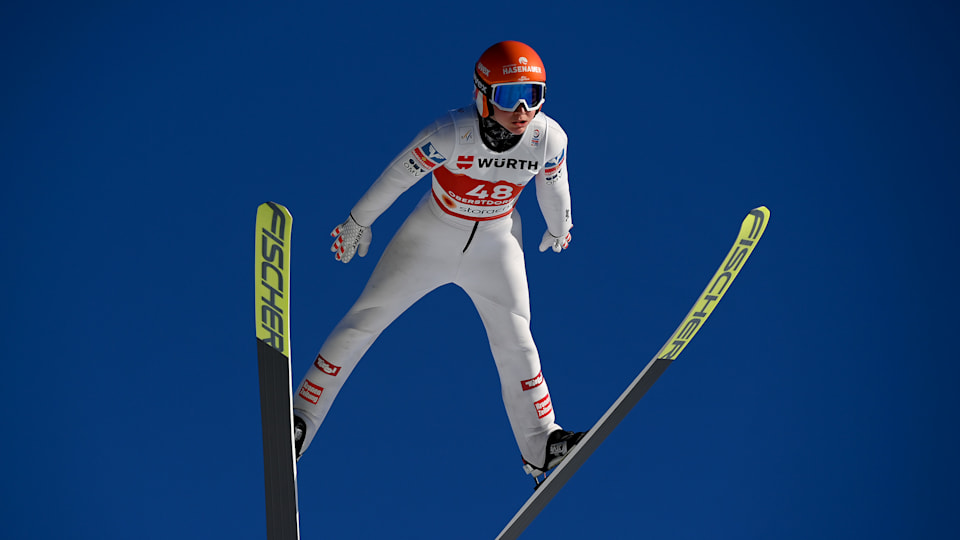
On 2 October, Austria's Marita Kramer and Japan's KOBAYASHI Ryoyu were crowned winners at a thrilling final summer ski jumping event before the winter World Cup season begins in earnest in November.
On an artificial surface, Kramer landed a jump of 141.5m on her second attempt to see off the challenges of overall Grand Prix champion Ursa Bogataj and Japan's TAKANASHI Sara, the holder of the record for most individual World Cup wins in the history of the sport.
After the event, a delighted Kramer expressed her desire to take her form into the winter season: "When you have a great jump you realise it immediately after the take-off and that's the best feeling," she told fis-ski.com. "In winter I want to continue jumping like this and I think I'm on a pretty good way."
Bogataj, who can now lay claim to the overall championship after finishing with a score of 600 over the course of the Grand Prix 2021, spoke about her surprise at winning the title: "I didn't expect this at all. I have just returned from an injury and I thought that achieving that would be impossible for me, but it happened. I would be happy if I could also win in winter, but I know that there are many competitors who also have big goals."
Japan's Takanashi finished the Grand Prix 2021 in second place on 320 points with the day's winner Kramer in third on 272 points.
In the men's competition, Japan's Kobayashi jumped farthest to secure a win that puts him in a strong position in the lead-up to the World Cup season. His totals of 138m and 140m were enough to triumph over Norway's Halvor Egner Granerud, the 2020-21 World Cup champion.
Kobayashi, who was named World Cup champion in 2018-19, was most happy about his consistency on the day, stating: "Last winter I always only had one good jump, today I was able to show two good jumps. I'm really looking forward to the winter season and I'm on the right track."
In the overall standings, Egner Granerud maintained his place at the top of the table, with Poland's Dawid Kubacki second and Jan Hoerl of Austria third.
The ski jumping World Cup begins on 21 November, with final qualification for Beijing 2022 decided on 16 January 2022.
Ski jumping in one minute
- The basics: In competition, jumps are evaluated by the distance travelled and the style of the jump. The men's individual normal hill and large hill competitions consist of two training sessions, a qualifier, and the final. In the men's team event (90m hill), there is a trial round and then two rounds of competition.
- The women's normal hill has no qualifying round and instead proceeds straight to the final, which consists of one trial jump and two rounds of scored jumps.
- The mixed team ski jump competition takes place on the normal hill with a woman-man-woman-man sequence, with the same scoring method as the men’s competition.
- Olympic history: Ski Jumping has been part of the Winter Olympic programme since the first Olympic Winter Games at Chamonix 1924, when the men's large hill was the sole event.
- A normal hill competition was added for the 1964 Innsbruck Games, with the men's team large hill joining the programme in 1988. The women's competition was added in 2014, while the mixed team event is new for 2022.
- Olympic medals by nations: Norway has been the preeminent force in ski jumping, winning 35 medals (including 11 golds).
- Finland is second in the medal rankings with 22 (thanks to their 10 golds), with Austria third with 25 (but only six golds).
- Athlete Olympic medal leaders: Matti Nykanen (FIN) is the most decorated ski jumper in Olympic history, winning four golds and one silver. Simon Ammann (SUI) has also won four gold medals at the Games. Carina Vogt (GER) won the inaugural gold medal in women's ski jumping at Sochi 2014, while Maren Lundby (NOR) is the reigning Olympic champion. Sara Takanashi (JPN), who won bronze in PyeongChang, holds the record for most World Cup wins among all athletes with 60.
